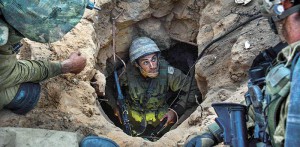The IDF has begun operational deployment of an advanced system based on sensors for detecting attack tunnels along the border with the Gaza Strip. The alarming extent of the threat was revealed during Operation Protective Edge, when Hamas squads penetrated Israeli territory using a tunnel network, causing losses to IDF forces and terrorizing residents of the south.
Elbit Systems Ltd. (Nasdaq: ESLT; TASE: ESLT) developed the new system in cooperation with a small startup, the Geophysical Institute of Israel, and the Ministry of Defense Administration for the Development of Weapons and Technological Infrastructure. The system contains a variety of sensors designed to provide alerts of tunnel digging.
Sources inform “Globes” that initial experimental deployment of the system on the Israel-Gaza border began in April 2014, three months before Operation Protective Edge. As part of that deployment, the feasibility of using sensors to provide reliable warnings of underground activity to a special IDF control room, while minimizing false alarms, was assessed. The large number of attack tunnels aimed at Israel dug by Hamas was discovered only during the 50 days of warfare in the south, forcing the IDF to operate underground on the outskirts of towns and villages in the Gaza Strip in order to expose and destroy the route of more than 30 such tunnels.
The IDF realized at the time that there was no alternative to expediting measures that would eventually facilitate the development of a technological system that would do to the tunnel threat what the Iron Dome system did to the rocket threat by the terrorist organizations. Development of the system was speeded up in recent months, while its deployment was extended.
Defense sources told “Globes” in the past few days that the sensors and advanced algorithms on which the system is based have already provided the IDF with warning of the presence of a tunnel that constituted the infrastructure for a possible future terrorist attack on Israeli territory. Deployment of the system is continuing at present, and when work is completed on the section selected by the Southern Command and the Gaza Division will be well covered against the underground threat.
The problem facing decision-makers is now primarily the large amount of money required. The system is expensive; a defense source estimates the cost of each kilometer at $1 million, although other sections along the border will require coverage that will raise the cost of per-kilometer deployment to $2 million. These large amounts are no surprise to the IDF, which knew that any technological solution to the tunnel threat in Gaza, and possibly also to future defense needs along the northern border, would pose a substantial budget challenge.
In response to questions from “Globes,” the Ministry of Defense said, “We do not wish to comment on these matters.”



